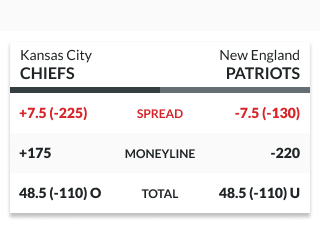Point Spread Betting Meaning
Spread betting is any of various types of wagering on the outcome of an event where the pay-off is based on the accuracy of the wager, rather than a simple 'win or lose' outcome, such as fixed-odds (or money-line) betting or parimutuel betting. A spread is a range of outcomes and the bet is whether the outcome will be above or below the spread. Betting on a team on the point spread on either side. This allows you to move the point spread around a little bit by a 0.5 point, one point and sometimes more. A push is when you tie on the point spread. You’ll get your money back. While some point spreads are on a half-number, many are on a whole number.
Point Spread betting is basically betting by how much a certain team will win or lose. The whole concept of point spreads is based on the principle of underdogs and favorites. The favorites (a team that is expected to win) “lays” points to the underdog (a team that is expected to lose) to make up the difference in equality. Do not confuse it with over/under betting, where you are betting whether the total score of the teams will be over or under a predicted amount (see our Basketball Over/Under Betting article). The whole point is to provide an incentive for the bettors to wager on the underdogs and balance the sides on betting a little.


What Does A 1 Point Spread Mean
* Please see illustration below to help understand point spread bets, text explanation follows.
(-110) Line
Unless specified otherwise, it is always assumed that the money line for spreads is (-110). That is, if you bet $110 on either of the teams, you will get $100 back. Once in awhile you will see different money lines for different spreads. This will most likely happen in some kind of alternative bets, like proposition wagers.
Point Spread Examples:
– Boston Celtics are playing against Miami Heat in the NBA playoffs.
- Boston Celtics (+5)
- Miami Heat (-5)
If you are betting on Boston, then they have to win by 5 points for you to win. For example, if the final score is 96-90 for Boston, then Celtics won by 6 points, which is larger than 5; thus, if you bet $110 on Boston, you will win $100 profit, assuming that it is a standard (-110) line.

If you are betting on the Miami Heat, then they can lose by no more than 5 points – or win. For example, if the final score is 103-100 for Boston, then Miami Heat only lost by 3 points. 3 is less than the 5 point spread, so you will win $100 profit if you bet $110.
A “Push”
In the above example, if the final score is 105-100 for the Celtics, then the spread is exactly 5 points. Thus, Boston did not win by more than 5 points, but instead, they “tied” it. In such cases, sportsbooks have to return the wagers to the bettors.
To prevent this, a lot of the times sportsbooks will utilize a 0.5 element. That is, they will show the same odds as:
- Boston Celtics (+5.5)
- Miami Heat (-5.5)
In this case, Boston has to win by more than 5 points and Miami could lose by 5 or less points, for it to happen. If the spread is 105-100 for Boston, those who bet on Miami will win the spread.
Basketball Point Spread Betting Tips and Strategies
Point spreads are the most widely available type of bet in basketball. A lot of the time, the best spreads will be the biggest ones. It sounds counter-intuitive at first but it is rather easy to grasp once you get a hang of it. Will the Bulls lose to the Lakers by less than 1 point or by less than 20 points? If you are betting that the Bulls are going to lose by less than 20 points, then they can still lose by that 1 point and your bet will be a winner. Hence, look at different sportsbooks and find the biggest spreads. The money line for it will most likely be at (-110) anyways, so you will be getting the same money for a higher probability of winning.
Betting Point Spread Explained
Be Objective
What Is Point Spread Betting
Another important basketball point spread betting tip is to always stay objective. Many basketball fans tend to let their emotions get in the way of their wagers. For example, Notre Dame is playing UCLA in the NCAA playoffs. Maybe you went to Notre Dame and you are a huge fan of their basketball team. Clearly you are biased towards that team. Even if you know that Notre Dame might lose, you are inclined to bet on them regardless of any spreads, simply because you like them. That is a subjective bet that will lead you to losing money. The best thing to do when you know that you have a bias towards a certain team is to stay away from that bet entirely; think strategically and not emotionally when dealing with money.



